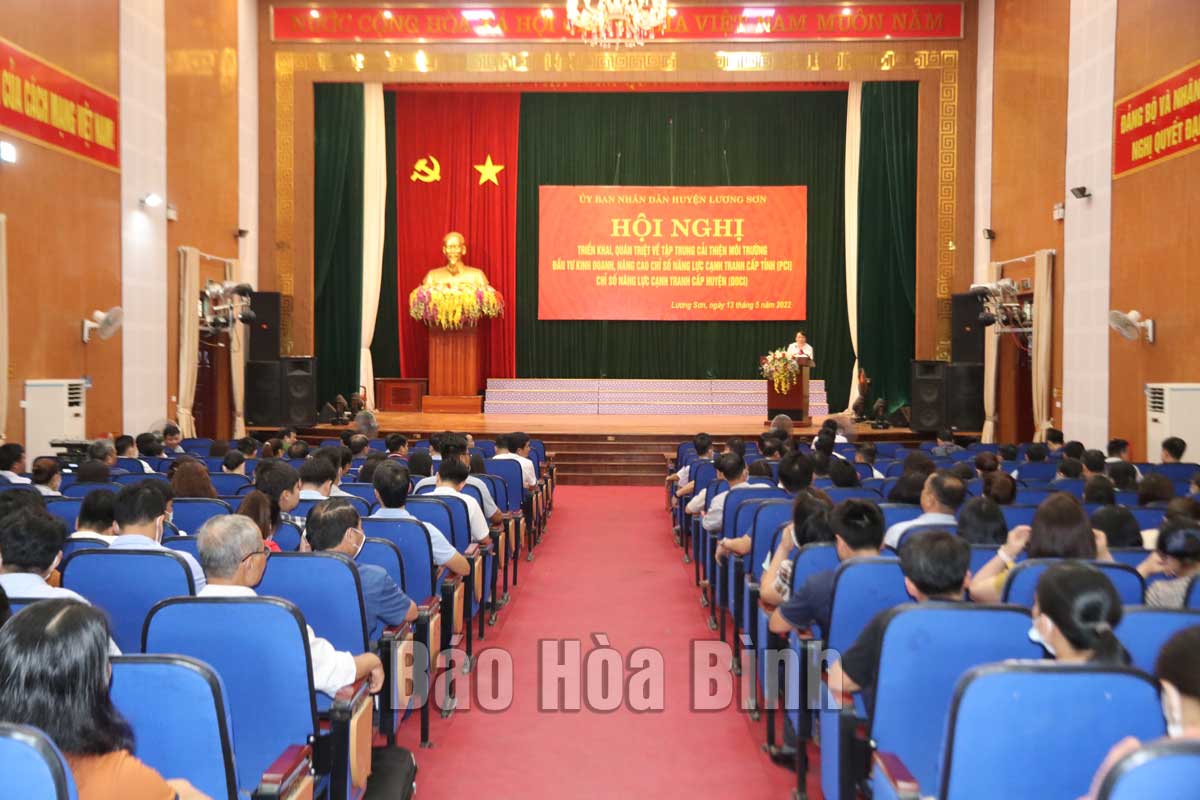
(HBO) – The People’s Committee of Luong Son district held a meeting on May 13 to discuss measures to improve its investment and business environment and increase the provincial competitiveness index (PCI) and district and department competitiveness index (DDCI). The event was chaired by Nguyen Van Danh, Chairman of the district People’s Committee.

An overview of the event.
According to a report delivered at the event, in
2021, Hoa Binh recorded a low PCI at 57.16 points, 5.64 points lower than that
in 2020, ranking 62rd among localities nationwide, dropping 18 positions from
2020.
Meanwhile, Luong Son ranked seventh out of 10
districts and city in Hoa Binh with 71.59 points. Particularly, the district
showed higher performance in three component indices compared to the average
result of the province – the market participation cost; cost for administrative
procedure and law implementation, and business support.
At the event, participants discussed
shortcomings and factors affecting the district’s performance in DDCI in 2021.
Concluding the event, Chairman of the district
People’s Committee Nguyen Van Danh asked local officials and Party members to
promote the achievements and seek ways to deal with current problems, while
improving their sense of responsibility and working coordination in all fields.
They were requested to sign a commitment to fulfilling their assigned tasks.
At the same time, the district should focus more
on personnel training to provide officials for one-stop-shop agencies, while
making socio-economic development information transparent, strengthening the
application of information technology in administrative procedure processing,
he stressed./.
Hoa Binh province is undergoing a dynamic transformation amid Vietnam’s national digital transition. Building on Poliburo’s Resolution No. 57-NQ/TW on breakthroughs in science, technology, innovation, and national digital transformation, the province has rolled out a wide range of practical action plans. A standout initiative is the "Digital Literacy for All” movement, an effort to ensure that no one is left behind in the digital era.
Hoa Binh province is undergoing a dynamic transformation in the wake of the national digital transformation movement. Building on Resolution No. 57-NQ/TW of the Politburo on breakthroughs in science, technology, innovation, and national digital transformation, the province has implemented a wide range of practical action plans. A standout initiative is the "Digital Literacy for All” movement ambitious effort to ensure that no one is left behind in the digital age.
With a spirit of unity and proactive problem-solving, the Party Committee, the government and the people of Dong Lai Commune (Tan Lac District) have made great strides in implementing the resolutions of the 24th Party Congress of the commune for the 2020 - 2025 term. Focusing on leadership and practical actions, the commune has brought the Party’s resolutions into daily life, creating strong impacts and pushing the local development forward.
Amid the nationwide push for digital transformation, young people in Hoa Binh Province are stepping up as dynamic pioneers, applying technology to enhance Youth Union operations and expand the reach of youth-led initiatives. Through creativity and adaptability, Youth Union organizations at all levels have introduced a series of practical solutions, contributing to modern governance and community development.
In recent years, An Nghia commune, located in Lac Son district, has stepped up administrative reform, focusing on improving the quality and efficiency of its single-window service unit for receiving and processing administrative procedures. These improvements have helped create favourable conditions for local residents and organisations to handle administrative procedures, contributing to the commune’s broader socio-economic development.
The Prime Minister-approved master plan to develop the multi-use value of forests ecosystems through 2030, with a vision to 2050, aims to improve the management and sustainable use of forest resources, create jobs, increase incomes, and improve the living standards of ethnic minorities, people in mountainous and remote areas, forest workers and those living near forests.



